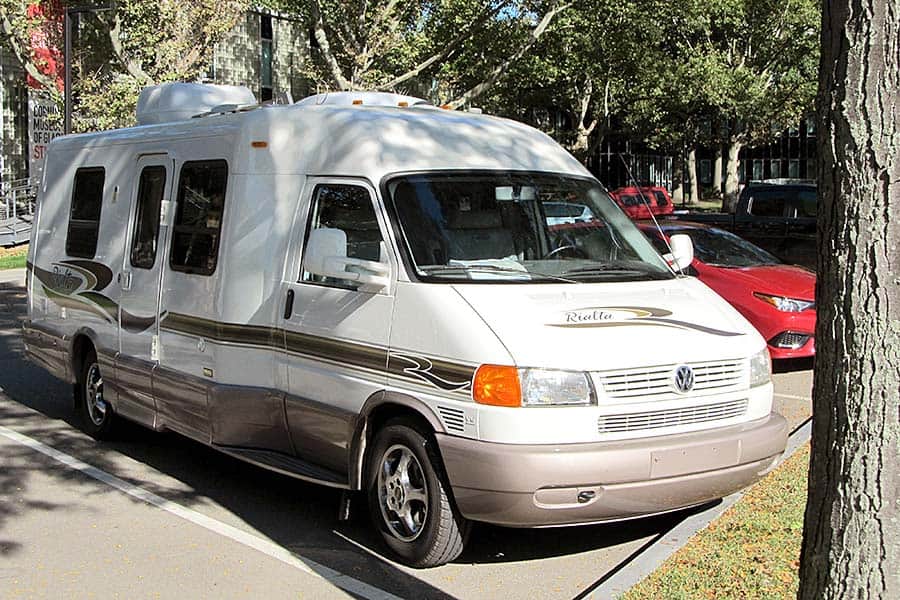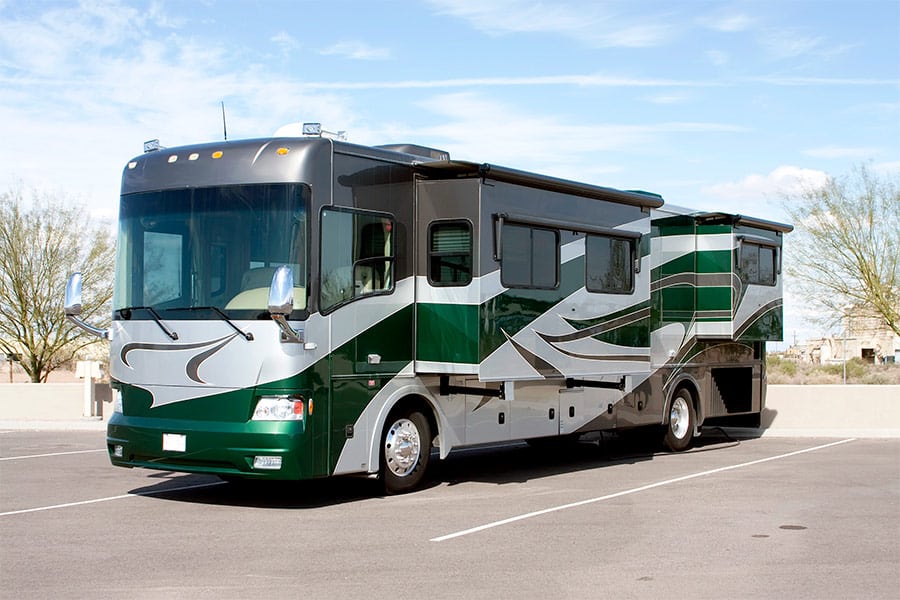
When you’re trying to pick out a new vehicle for your traveling and camping adventures, there are different choices available. Two of those choices are camper vans and motorhomes. They’re both perfectly viable options, but there are definitely dissimilarities between the two of them.
So, what are the main differences between camper vans and motorhomes? Camper vans are a smaller version of a motorhome. They usually have a sleeping area for 2-3 people, a small kitchen, maybe a bathroom. Motorhomes are larger and better suited for families; most have slide-outs, a bedroom, kitchen, and bathroom.
There are also many other features that could make one more beneficial than the other, so stay tuned.
Throughout this article, you’ll learn the following:
- The main differences between the two types of vehicles
- Pros and cons of each choice
- Prices for repairs, maintenance, resale, and more
- Camping options
- How to make them last longer
- Where you can park and store them
What Are The Differences Between Camper Vans And Motorhomes?
The five most noticeable differences are the laws, lengths, weights, heights, and interior design. Motorhomes are a great choice if you want to go camping for several days since you’ll be able to enjoy a massive space. On the other hand, camper vans offer a perfect scenario for weekend trips when you’ll be spending most of the time outdoors.
Laws
Motorhomes certainly have more restricting laws than camper vans do. That being said, there aren’t very many rules that will limit you and your travel crew. However, it’s worth noting that specific states, such as California, New York, and Illinois, have length and weight laws that require licenses and stickers.
The average law that affects weight limit tops out at 26,000 pounds. Most motorhomes don’t even come close to this number, but it’s still smart to keep in mind. The length restrictions typically start between 40 to 45 feet. Since Class B RVs never come close, you’ll likely never need anything special for them.
We also have a post “Can Anyone Drive A Camper Van?” that goes into this subject in a little more detail.
Class A’s are the largest RVs in most cases. If you have to deal with laws, it’ll probably be with them. Again, it depends on the state, county, and city where you reside. If you’re choosing a motorhome over a camper van, these laws are something to consider.
Length
It’s no secret that motorhomes are much longer than camper vans. After all, “home” is in the name. You’ll be able to walk around and enjoy the extra space, but it’ll also put a damper on the driving situation. Most motorhomes are between 24′ to 45′. Depending on the class that you choose, it could be shorter or longer than the average.
On the other hand, camper vans are usually between 18′ to 22′, which is much smaller than a motorhome. If you’ve driven large trucks and vans, you won’t have a problem with a motorhome. Camper vans are much easier to operate for people who are used to compact cars, small trucks, and other vehicles.
Weight
Camper vans are much lighter than motorhomes since they’re smaller on average. The typical camper van weighs between 6,000 to 8,000 pounds, but the average motorhome weighs between 10,000 to 20,000 pounds. The large variation between weights is due to the multiple types and sizes of motorhomes.
While you might not think that the weight could cause too many problems, you’d be wrong. Aside from the previously mentioned laws and restrictions, heavy vehicles also have to go through weigh stations, they take longer to accelerate, and the max speed is topped out far lower than the max speed of a camper van.
Height
RVs are notorious for being too tall for drive-thrus, low-clearance structures, trees, and more. Don’t worry, though; you can still enjoy the drive by taking the scenic route. On top of that, modern infrastructure accommodates tall vehicles, trees are trimmed back, and so on.
A Class C RV is usually about 10 feet tall, eclipsing the average height of a camper van, which sits around 8 feet tall. Even bigger than that is a Class A motorhome. These large buses come in at a staggering 13.5 feet! Although height can be a limitation, most campgrounds have large sites to park almost any vehicle.
Interior Design
Another huge difference is the interior design.
Motorhomes have more room, which means they have more amenities. Cabinets, refrigerators, ovens, bathrooms, and separated bedrooms are all prevalent in RVs.
Camper vans are becoming more impressive these days by boasting the same features, aside from a closed-off bedroom. Unfortunately, the shower and the toilet usually share the same space to be more efficient. If you can deal with this issue, you’ll love having everything you need in a compact vehicle.
Other Posts of Interest
- How To Keep Cool Sleeping In A Van: A Very Practical Guide
- Review: Are Quick Dry Travel Towels Any Good?
- How to Choose the PERFECT Mattress for Camping in a Van
Pros And Cons Of Camper Vans vs. Motorhomes
Truthfully, both types of vehicles are excellent in their own right. Camper vans are meant for some people, while motorhomes are better for others.
To find out which is the best choice for you, let’s check out some of the advantages and disadvantages of each.
Pros of Camper Vans
Having a semi-compact, reliable vehicle to travel in is a convenience, unlike any other. Camper vans are usually slightly larger than cargo and passenger vans, which makes them easy to fit into small spaces that would otherwise be impossible with a motorhome.
The size of a camper van makes backing up and parking a breeze. Whether you’re pulling into your favorite lakeside campsite or you’re trying to navigate the parking lot at a busy grocery store, camper vans win the battle versus motorhomes every time.
If you’re not used to driving big vehicles, a camper van will be the most comfortable choice for you. There’s still a learning curve, but you won’t be entirely out of your element. Many modern camper vans also come with backup cameras and spacious windows.
The price of a camper van is something that most people can work with. They cost more than the average van, but far less than a massive Class A RV. If you’re camping on a budget, nothing beats a fully-loaded camper van. Finding a used model will save you even more money.
Some campgrounds don’t allow vehicles that are too big because they block the surrounding scenery. Camper vans check all of the boxes, so you’ll never have to change your reservations or find a new site to camp at. They’re also easier to pull into the hard-to-reach sites on steep inclines.
Cons of Camper Vans
When you’re camping for three or more days, the size of a camper van might feel limiting. It’s definitely better than staying in a tent, but it’s a bit enclosed, nonetheless. Also, there’s the issue mentioned earlier about the bathroom having a toilet and a shower in the same space.
If you’re taking pets along for the ride, you might have a hard time keeping their food, water, and litter all in one area. As you drive, everything moves around. Not to mention the fact that they’ll undoubtedly get in your way when you’re walking through the vehicle.
Finally, camper vans often don’t have enclosed bedrooms. There’s no privacy throughout the van (you’ll still be able to close the curtains to block the outside world from looking in). If you’re camping with friends or anyone else, everyone will have to leave when you’re going to the bathroom or changing clothes.

Pros of Motorhomes
Anyone who’s stayed in a motorhome knows the freedom that it offers when it’s parked. Having a house on wheels is unexplainably fun and convenient. There’s lots of room available. You can enjoy your vacation without being boxed in a small van.
Motorhomes are much taller than camper vans. As you probably read earlier in the post, they can get as tall as 13.5′. It doesn’t matter if you’re the tallest person in the world; you’ll be able to stand and walk around in a motorhome without a problem.
Used motorhomes hold onto their resale value for quite some time. Although the initial drop is substantial once you drive it off the lot, you can sell a motorhome for a high price over a decade later. Add a few renovations, and there’s no telling what you’ll be able to get back from the investment.
Many modern motorhomes come with stabilizer jacks to level the vehicle when you park it. Rather than being uncomfortable trying to sleep or walk on an incline, you can maintain a flat surface for the duration of the camping trip. Some camper vans have this feature, but it’s usually exclusive to motorhomes.
Some campgrounds only allow RVs, which is a huge benefit if you don’t want to camp in a tent. Drive your motorhome right up into the site, level the stabilizer jacks, and enjoy a nice, relaxing evening by the campfire that sits right outside of your door. What’s better than that?
Cons of Motorhomes
The most apparent disadvantage of motorhomes is that they’re massive. If you haven’t driven large vehicles before this one, you’ll have a challenge trying to take turns, park, and perform other routine driving maneuvers. They’re also challenging to pull into campsites, especially when the area is full of campers.
Although the size is nice, motorhomes come with a costly repair bill. Think of the sewage pipes and tanks, cabinetry, doors, flooring, bedding, pumps, and more. That list doesn’t even include the engine and other vehicle parts.
Since they’re so heavy, motorhomes tend to get flat or low-pressure tires very often. If you don’t fill the tires with air regularly, you could end up with a popped tire on the highway. It’s a good practice to familiarize yourself with replacing a tire if you decide to get a motorhome.
The Cost of Motorhomes And Camper Vans
The cost of both vehicles can be broken down into three categories:
- Repairs and maintenance
- Initial purchase price
- Resale value
Let’s check out each of them below.
Repairs and Maintenance
Motorhomes and camper vans are so beloved because they come with everything (or almost everything) that you have at home. They have fridges, air conditioner units, entry stairs, and more. Here are the average repair prices for those items:
- Refrigerator replacements: $1,000 to $2,000
- Air conditioner units: $600
- Entry stairs: $300+
- Electrical inverters: $2,000+
- New tires: $250 to $900 per tire
You can expect to pay even more money when labor costs are involved. See your local RV dealership for repair prices. It should also be noted that camper vans tend to have prices that are a bit less since everything is smaller and less demanding than on a motorhome.
Initial Purchase Price & Resale Value
Almost everyone knows that motorhomes cost significantly more than camper vans. They’re much larger, and they have more to offer. That being said, the price differential could be a deterrent for some people. Let’s check out the statistics:
- New motorhomes cost between $70,000 to $300,000+.
- Used motorhomes range from $3,000 to $50,000.
- New camper vans cost between $30,000 to $60,000.
- Used camper vans range from $3,000 to $20,000.
These statistics are rough estimates based on the average motorhome and camper van sales. They could vary dramatically in your local area, but they’re still a clear indicator that motorhomes are much pricier than camper vans in almost every situation.
Camper vans and motorhomes are both investments. They often cost more than a commuting car, but you’re using them much less frequently. If you have a hard time justifying such a purchase, you should consider buying a used one. As you can see from the previous prices, they’re much cheaper than if you bought them fresh off the lot brand-new.
How Long Do They Last?
Asking how long a vehicle lasts is difficult to answer. If you follow through with a routine maintenance schedule, you can make almost any car, truck, van, or motorhome last several decades. On the other hand, reckless operation and forgetful maintenance can lead to a short life.
Motorhomes are made to last between five to fifteen years. That being said, you can extend the longevity quite a bit by staying on top of repairs before they become a serious issue. Changing fluids regularly, rotating and replacing tires, using the correct toilet paper for the sewage system, and checking all of the electrical components as recommended by the manufacturer will extend the life of your investment.
It’s not uncommon to see people driving motorhomes of all sizes well beyond the previously mentioned fifteen-year mark. You can even push upwards of twenty to thirty years, as long as you follow the suggestions above.
Camper vans are designed to last between ten to twenty years. Since they have fewer working components, they tend to stick around a bit longer. Again, maintenance and care both can influence the lifespan of these vehicles.
To have a camper van that lasts for twenty to thirty years, most of the repairs and maintenance happens under the hood. Don’t let the engine block get torn to shreds by improper usage or neglected fluids.
As with any vehicle, you shouldn’t leave a motorhome or a camper van in the same spot for too long. Drive them around the block for fifteen minutes every few weeks to get rid of the cobwebs. Also, follow the mileage maintenance schedule that comes with the vehicle. You can prevent breakdowns and significant problems by sticking to the manufacturer’s tips.
Finally, don’t neglect the exterior of your camper. Wash the exterior down with soap and water once a month, wipe the windows, and remove any leaves or other debris that build up over time. The paint can become dry and crack if you don’t keep it clean. Perhaps the worst offender of all is the awning that some of these vehicles come equipped with.
Routine Maintenance
Camper vans and motorhomes have the same necessities as all other vehicles. You have to change the oil and transmission fluid, use coolant, replace the tires, change the hoses, and so on. However, they have a unique set of requirements since they have a much more detailed interior design.
Sewage systems
The sewage systems of both vehicles work similarly. The toilet has a valve that opens when you flush it, which leads through a short pipe down into a tank. This tank is known as a black water tank. The whole system should be properly maintained to prevent disasters. Using thin, RV-approved toilet paper is the most crucial part of the process.
Every time you go out on a trip with your camper van or motorhome, you should put fresh water into the tank. You don’t want to fill it up all the way, but there should be enough water to prevent pyramiding. There are also toilet paper dissolvers that you can purchase.
After the trip, stop by an RV dump station to get rid of everything accumulated over the weekend. Always start with the black water tank, then follow it up with the gray water tank. Gray water is the liquid that comes from using the sink and shower. Doing it this way cleans out the pipes from the black water by using the gray water to rinse them.
Water pump
Another unique feature that needs maintenance is the water pump. Anything in your vehicle that uses water, such as the sink and the shower, needs a driving force.
The water pump turns on and adds pressure to the pipes, propelling the water to whichever source you’re using. This process is why you’ll notice a dramatic drop in pressure if you’re using multiple sources at the same time.
Water pumps require a small amount of electricity to run. There should be a monitor somewhere in the vehicle that indicates where the power sits. You also should be able to locate a sensor that tracks how full each tank is right next to the same monitor.
Additional Maintenance
Gaskets, seals, lubricants, diffusers, impellers, motors, and hoses are some of the parts that should be inspected regularly to prevent problems. The water pump usually sits underneath the bed or in a cabinet. Before you go on any trips, make sure that you check the pump, monitor, and sensors.
Other common areas of a camper van or a motorhome that require maintenance include cabinet hinges, the showerhead, sink faucets, TVs (if you have any in the vehicle), coffee machines, couches, and so on.
All of the parts that you have to deal with in a house are also included in a camper. The only difference is that they’re built for less usage, which means they don’t last as long. Look out for chipped plastic, loose fittings, and leaks wherever they could be present.
Leaks
Speaking of leaks, you should have a professional repair person look for leaks once a year. You might need to touch up a few spots with silicone caulking to stop water from pouring through.
A leak that goes untreated in a camper van or a motorhome can cause mold, rust, deterioration, and wood rot. Under no circumstances should you leave a leak to dry or go away on its own.
Where Can You Store Your Camping Vehicle?
Storage is another concern for camper vans and motorhomes. After all, you can store your camper van in a garage or right in your driveway. Unfortunately, motorhomes are usually too bulky for driveways and garages. Even if there’s room, they take up the entire visual of the house.
Read our post, “Can A Sprinter Van Fit In A Garage?” if you are considering purchasing a Sprinter van.
However, camper vans aren’t always stored at home. You can find an RV, camper van, and trailer storage lot nearby to park them whenever you’re not using them. Most owners only bring their camper home when it’s time to fix it or get ready for the next camping vacation.
If you decide to keep your motorhome at home, you should check local laws and regulations first. Some cities prohibit you from leaving a vehicle set that’s too large because it ruins the scenery, and if parked on the street it could cause traffic jams in congested neighborhoods. You should also ask for your neighbor’s opinions before doing so, as a common courtesy.
Landowners have the benefit of being able to park their vehicles wherever they want to on their land. The only thing to consider is whether or not it’s level. Muddy, sandy, or unlevel ground can wreak havoc on a suspension system, as well as the tires. Try to always park your camper vans and motorhomes on a solid surface.
To help protect your camper van, when it is not in use, cover it up with this Class B cover. It fits vehicles up to 21 feet in length, has zippers for access, and is for high tops. It’s perfect for keeping your camper van out of the elements.
Here is another cover for your motorhome. This RV cover is made out of marine-grade fabric, comes in different sizes, and the extended roof protects the corners. It’s a perfect way to protect your investment when you aren’t using it.
Your last option would be a storage garage. These convenient garages are designed to hold vehicles for extended periods. Most of them aren’t high enough for a 13.5′ Class A motorhome, but you’ll be able to leave your Class B or a camper van there without any issues. Some Class C’s are small enough to fit, as well.
Where Can You Camp With Motorhomes And Camper Vans?
Most campgrounds are made for walk-in’s, tent-only areas, and RV parks. Though you can park motorhomes and camper vans at RV parks, that being said, many restrictions prevent you from driving up to the other two types of campgrounds.
KOA campgrounds and other popular chain locations welcome vehicles and tents alike. If you’re worried about being denied, try to find a chain location where you know you’ll be accepted. Calling ahead is the best course of action, although most campgrounds will have all of the information that you need on their website.
We have a post “Do RV Parks Allow Vans?” that provides more information on van camping at RV parks.
The number one tip for finding camping locations with a camper van or motorhome is to find the site that’s the easiest to fit into. Everyone loves a good view, but nothing ruins a camping trip like being stuck in the mud or failing a parking attempt repeatedly.
Van Camping Life Tip: Camper vans also offer the luxury of being able to park out in the wild where the roads aren’t wide enough for a motorhome to get to, you can even spend the night in a parking lot, depending on your camper van.
Which Should You Get?
Between camper vans and motorhomes, there’s no ‘right’ answer. If you’re someone who’s comfortable with handling a large vehicle or you want more space when you go camping, then a motorhome is the choice for you. However, if you prefer mobility and you’re not used to big vehicles, then a camper van is the one that you should go with.
In the end, it’s all about why you want the vehicle. The most important part of owning a RV is to have fun going on adventures and enjoying nature. Isn’t that what camping is all about?
Conclusion
Whether you choose a camper van or a motorhome, you’ll have to deal with the pros and cons.
One requires more repairs, but it also has more storage space and room to move around. The other comes with a toilet-shower room, but it’s easy to park wherever you go.
It’s all about weighing the odds to see which one wins the battle for you.
And to recap, here are the key takeaways from this post:
- Motorhomes are better for long trips and experienced drivers.
- Camper vans are easy to maneuver and cheaper than motorhomes.
- Store your camping vehicle in a storage garage, on your land, or in a motorhome lot.
- Don’t forget to factor repairs, maintenance, and resale value into your calculations.
- Both vehicles can last between ten to twenty years with proper care.
- Height, weight, length, and interior design are the main differences between the two vehicles.






